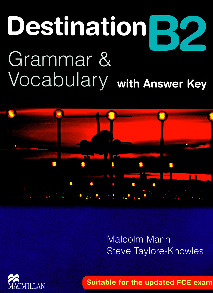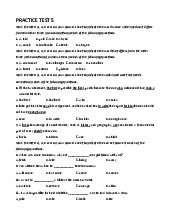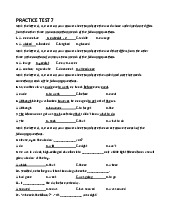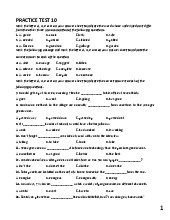


Preview text:
lOMoAR cPSD| 36844358
INVERSION (ĐẢO NGỮ) I. Khái niệm -
Đảo ngữ là hình thức ảo trật tự của ộng từ (hoặc trợ ộng từ) với chủ ngữ trong câu nhằm mục ích nhấn mạnh hoặc ể thể hiện cảm xúc
của người viết, người nói. -
Nếu trong câu không có trợ ộng từ thì phải mượn trợ ộng từ sao cho phù hợp với thì của ộng từ chính. (DO/ DOES) cho thì HTĐ; DID cho thì QKĐ). -
Phép ảo ngữ thường bắt ầu với một trạng từ hoặc cụm trạng ngữ. Thông thường các trạng từ dùng trong câu ảo ngữ là các trạng từ phủ
ịnh hoặc mang ý nghĩa giới hạn.
Cấu trúc chung của câu ảo ngữ có dạng: Adverb + auxiliary verb + S+ main verb
(cụm trạng từ, trạng ngữ) (trợ ộng từ) ( ộng từ chính) VD: Never have I
seen such a beautiful sunset before
II. Một số dạng cấu trúc ảo ngữ thường gặp
A. Đản ngữ với các trạng từ phủ ịnh/ giới hạn
1. Rarely/ Seldom: Hiếm khi
VD: Rarely do I see people read newspaper.
2. At no time/ Not once/ Never
VD: At no time did she offer to pay for gas.
Or: Not once did she pay for gas.
3. No sooner+ had+ S1+ P2+ than S2+ V2/ V-ed
= Hardly/ Scarcely/ Barely+ had+ S1+ P2+ when+ S2+ V2/ V-ed
(Vừa mới…………thì…….)
VD: No sooner had I left my house than it started to rain
Or: Hardly/ Scarcely/ Barely had I left my house when it started to rain.
4. On no account/ Under no circumstances: dù trong hoàn cảnh nào i nữa ….cũng không ược làm VD:
On no account must employees make personal phone calls from the office.
Under no circumstances must you show anyone this letter.
5. Not only….but: không những…mà còn
VD: Not only does Mara speak English and French but she is also learning Arabic.
6. Only then/ Only later: Chỉ ến lúc ó, chỉ sau ó
VD: Only then did I understand this question
Or: Only later did I understand this question.
7. Only in (place/ time): Chỉ vào thời iểm ó/ chỉ ở nơi ó.
VD: Only in winter do most lemon trees bear fruit.
Or: Only in Vietnam have I seen such a beautiful landscapes.
8. Only by+ V-ing/ N: Chỉ bằng
VD: Only by practicing English every day can you speak fluently.
9. Not until/ Not since/ Only after/ Only when+ Clause+ auxiliary verb+ S+ main verb VD:
Not until you sign this contract is this valid.
Not since Robin died has anyone made Maria laugh.
Only after you gra uate from university will you be able to apply for an internship here.
Only when I am alone can I relax.
B. Đảo ngữ với câu iều kiện lOMoAR cPSD| 36844358 1.
Câu iều kiện loại 1: If+ S+ V(HTĐ) ……, S+ will/ shall (not)+ Vo →
Should+ S+ (not)+ Vo+….., S+ will/ shall (not)+ Vo
VD: If I see her, I will tell her your message. →
Should I see her, I will tell her your message. 2. Câu iều kiện loại 2: If+ S+
V(QKĐ)………, S+ would/ could (not)+ Vo…. →
Were+ S+ (not) to V……, S+ would/ could (not)+ Vo….
VD: If he knew the answer, I could help you. →
Were I to know the answer, I could help you.
If+ S+ was/ were (not)………, S+ would/ could (not)+ Vo…. →
Were+ S+ (not) …….……, S+ would/ could (not)+ Vo….
VD: If he were here, he would know how to solve this problem. →
Were he here, he would know how to solve this problem. 3.
Câu iều kiện loại 3: If+ S+ had (not)+ P2….., S would/ could have P2…….
Had+ S+ (not)+ P2……, S would/ could have P2…….
VD: If I had known about Paul’s serious medical condition, I wouldn’t have complained about my little cold.
Had I known about Paul’s serious medical condition, I wouldn’t have complained about my little cold.
C. Đảo ngữ với so/ such
+) So+ Adj/ Adv+ auxiliary verb+ S+ main verb that+ Clause VD:
She was so sad that she could not say anything.
→ So sad was she that she could not say anything.
He runs so fast that no one can catch up with him.
→ So fast does he run that no one can catch up with him.
+) Such+ be+ a/ an/ the Adj+ S+that+ Clause. VD:
It was such a good novel that I read during the night.
→ Such was a good novel that I read it during the night.
D. Đảo ngữ với as (cũng như là): as+ auxiliary verb+ S VD:
They launched a new model last week. Their main competitor launched one too.
→ They launched a new model last week, as did their main competitor. E. Đảo ngữ với các trạng từ chỉ phương hướng/nơi chốn: Adv of place + V + S VD: Near my house is a bus stop. Here comes the fall. There comes the bus. lOMoAR cPSD| 36844358




